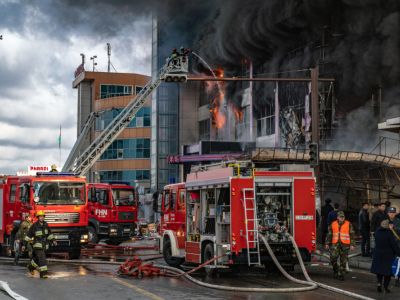Taiwan fears critical support from the United States may weaken as Washington seeks rival Beijing's backing to eradicate global terrorism in the wake of last week's attacks, analysts say.
Following the killer attacks last Tuesday, the US administration may prioritize fighting terrorism over containing China, which is determined to reunite with Taiwan, by force if necessary, they added.
China's President Jiang Zemin lost no time in voicing his condolences to the United States after the terror strikes in New York and Washington in which an estimated 5,000 people are believed to have been killed.
China's Vice Premier Qian Qichen also told US Secretary of State Colin Powell in a telephone call that the fight against terrorism "needs the cooperation of the international community."
Analysts in Taiwan said the Chinese leaders were sending a veiled signal to Washington that President George W. Bush needed to adjust his country's China policy -- including the thorny Taiwan issue -- if he hoped to get Beijing's cooperation to fight terrorism.
"After the attacks, the Bush administration will have to adjust its diplomacy," said Chang Lin-cheng, professor of political science at National Taiwan University.
"And Bush will have to obtain the cooperation of major countries, including China, if he hopes to ensure the imminent crackdowns on terrorists be successful," she said.
Taiwan's Foreign Minister Tien Hung-mao has pledged full support to the US in fighting terrorism saying Taiwan had "no option" but to back the United States, despite a lack of diplomatic ties between Taipei and Washington.
Chang this rush to show loyalty to Washington suggested fears that the US could ditch Taipei for the sake of its own interests.
Analysts said Taipei was not likely to feel the pain of any change of US focus immediately.
"But over a long term, Bush will have to tune its China policy," Wung Ming-hsien, director of Tamkang University's Graduate Institute of International Affairs and Strategic Studies.
"Among the impacts could be his arms sale policy towards Taiwan," he said.
Since his inauguration last year, Bush has back-pedalled from his predecessor Bill Clinton's policy of engagement with China.
In April Bush approved the biggest US arms package to Taiwan since 1992, comprising eight diesel submarines, four Kidd class destroyers and 12 submarine-hunting aircraft.
Beijing opposed any arms sales to the island which it has regarded as part of its territory awaiting reunification since their split in 1949 at the end of a civil war.
Despite Beijing's protests, Bush also allowed Taiwan President Chen Shui-bian to make unprecedented stopovers in New York and Huston to and from a Caribbean trip earlier this year.
"At least Washington would need Beijing's cooperation in the United Nations if Bush decides to fight back [after the attacks]," said Yang Chih-heng, deputy director of Taiwan Research Institute's Division of Strategic and International Studies.
However, "the biggest cooperation the US may get from China is not to veto its efforts of wars against terrorists," he said.
The US Congress has given the Bush administration an extra 40 billion dollars and permission to call up 50,000 reservists to both boost defensive measures and use "all necessary and appropriate force" to respond to the attacks.
Any strikes by the US and its allies are almost certain to be conducted in Afghanistan, whose fundamentalist Muslim rulers, the Taliban, have been harboring Osama bin Laden, the main suspect -- TAIPEI (AFP)
© 2001 Al Bawaba (www.albawaba.com)









